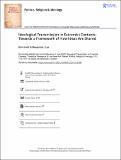Files in this item
Ideological transmission in extremist contexts : towards a framework of how ideas are shared
Item metadata
| dc.contributor.author | Knott, Kim | |
| dc.contributor.author | Lee, Benjamin John | |
| dc.date.accessioned | 2021-07-16T20:30:24Z | |
| dc.date.available | 2021-07-16T20:30:24Z | |
| dc.date.issued | 2020-03-04 | |
| dc.identifier | 274588984 | |
| dc.identifier | 1023bf57-09a1-4cb0-a746-d6ff25829a25 | |
| dc.identifier | 85081227906 | |
| dc.identifier.citation | Knott , K & Lee , B J 2020 , ' Ideological transmission in extremist contexts : towards a framework of how ideas are shared ' , Politics, Religion & Ideology , vol. 21 , no. 1 , pp. 1-23 . https://doi.org/10.1080/21567689.2020.1732938 | en |
| dc.identifier.issn | 2156-7689 | |
| dc.identifier.uri | https://hdl.handle.net/10023/23601 | |
| dc.description | This work was supported by the Economic and Social Research Council, under Grant ES/N009614/1 (Centre for Research and Evidence on Security Threats) with funding from the UK intelligence agencies and participating universities. | en |
| dc.description.abstract | Despite their centrality in academic and policy debates about radicalization and political violence, ideologies have been conceived narrowly, as cognitive, top-down, coherent and systematic. In general, those who have used the concept of ideology have failed to draw on ideological theory or on recent insights about its practice and embodiment, or location in space and time. Our interest is less in the content of ideology than in how it is shared by those for whom it matters. We offer an interpretive framework, based on six key questions about ideological transmission: What ideas, beliefs, and values are shared, how and why, by whom, and in which spatial and temporary contexts? Following a discussion about the methodological pros and cons of the framework, it is tested on a series of interviews with members of Aum Shinrikyo, the Japanese religious group responsible for the Tokyo subway attack in 1995. We assess the strengths and limitations of the framework for analysing the various dimensions of ideological transmission before considering what it adds to our understanding of the relationship between extreme beliefs and violent behaviour. | |
| dc.format.extent | 2148023 | |
| dc.language.iso | eng | |
| dc.relation.ispartof | Politics, Religion & Ideology | en |
| dc.subject | JZ International relations | en |
| dc.subject | 3rd-DAS | en |
| dc.subject | SDG 16 - Peace, Justice and Strong Institutions | en |
| dc.subject.lcc | JZ | en |
| dc.title | Ideological transmission in extremist contexts : towards a framework of how ideas are shared | en |
| dc.type | Journal article | en |
| dc.contributor.institution | University of St Andrews. School of International Relations | en |
| dc.identifier.doi | 10.1080/21567689.2020.1732938 | |
| dc.description.status | Peer reviewed | en |
This item appears in the following Collection(s)
Items in the St Andrews Research Repository are protected by copyright, with all rights reserved, unless otherwise indicated.

